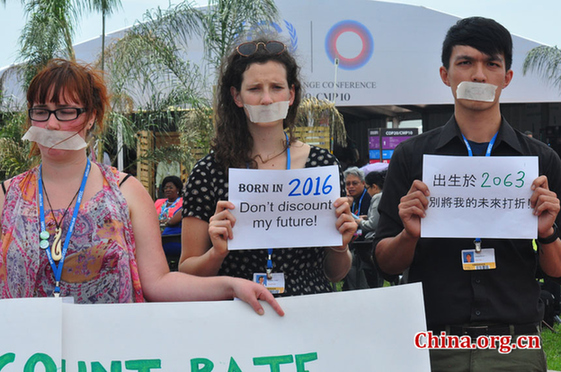China's changing image in climate debate
- By Fu Jing
 0 Comment(s)
0 Comment(s) Print
Print E-mail China Daily, December 10, 2014
E-mail China Daily, December 10, 2014
|
|
|
A handful of NGO members campaign at the Lima conference venue to stop fossil fuel use by 2050. [Photo by He Shan/China.org.cn] |
At a reception for a dialogue on climate change in Paris on Tuesday, a woman from Guangdong province, South China, handed me her name card. It stated she was a carbon trader by profession. This is probably among the newest type of jobs in China, and this was my first meeting with this kind of professional.
She told me that she graduated from Sun Yat-Sen University in Guangdong at the end of 2013, and was among the first group of 300 carbon traders in China.
I know that many people are now working in "green jobs" in China, whether for NGOs, in climate change research or even engaged in drawing up sustainability policies amid the country's efforts to improve its energy efficiency and control pollution.
As part of these efforts the government has set up several pilot carbon trading centers in Beijing, Shenzhen, Shanghai and other cities with a view to introducing a national emissions trading market in 2016. And according to its national plan to cope with climate change, it will try to link its national emissions trading market to overseas platforms of carbon trading.
It is obvious that a carbon trading market can play a big role in achieving the emissions reduction targets the government recently announced. China has pledged to reduce the amount of carbon it emits per unit of GDP to a range of 40 to 45 percent below 2005 levels by 2020, and also set a target of cutting carbon emissions from its secondary industry to 50 percent below 2005 levels by 2020. But as carbon trading is still a new concept in China, training and education are essential for those involved.
Very similar to stock exchange markets, the professionals in carbon market also include brokers, analysts and traders. The increasing carbon trade illustrates that market-oriented approaches to control emissions are gaining momentum in China.






